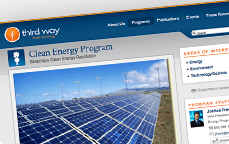The PowerBook
The PowerBook is a collection of discrete proposals to change federal policy in ways that will increase clean energy use and spur energy innovation. These new policies would modernize America’s energy systems, making them cleaner, more reliable, and more affordable.
The PowerBook proposals touch on every sector of our energy economy. They are ideas and best practices borrowed from industry, academia, and state and local government. Each proposal is driven by scientific and economic data, and those numbers are clearly delineated for each component of our plan.
How to Use the PowerBook
The PowerBook is a menu of á la carte options, not a blueprint that requires every element to hold it together. It is designed to provide federal policymakers and regulators with a selection of policy ideas to help solve specific challenges in how our nation produces, transports, and consumes energy.
SECTORS
The PowerBook is divided into five economic sectors: power, transmission, buildings and efficiency, industry, and transportation. Each sector includes multiple components, which are specific elements of that sector that require some policy change. Components that impact multiple sectors, such as clean energy finance or regulatory reform, are included in a sixth cross-sector section.
COMPONENTS
Each component has three parts: a short overview, an analysis of the challenges and opportunities for energy, employment, and the environment, and an implementation section that outlines specific actions that Congress, the administration, or the independent regulatory agencies can take. The policy recommendations in the implementation section are intended to serve as frameworks for more detailed legislation or regulatory reform proposals.
The components in the PowerBook reflect the input from a broad group of business leaders, policymakers, analysts, and academics. We will update them regularly to add new policy ideas, revise existing proposals, and reflect progress made in Congress or through the regulatory process. We invite readers to provide us suggestions to build upon the proposals in our components or new policies we should consider adding. Please send us your comments via the contact page.
OUR ANALYSIS
The PowerBook provides both pragmatic ideas to move America toward cleaner energy and data showing the potential impacts that these policies could have on our energy systems and economy. By combining several datasets, from economy-wide to industry-specific, we have developed a basic methodology for each component to estimate the effects these policies would have on CO2, conventional pollutants, and domestic energy needs. While future, independent modeling will provide higher accuracy, the current metrics offer a general barometer of impact and a way to compare the effects of various components.
In our metrics in each component features two sections with the low-medium-high scale rather than specific numbers.
Jobs impact estimates the numbers of jobs our policy proposals are likely to create if fully implemented.
- Low is 0-999 jobs
- Medium is 1,000-9,999 jobs
- High is 10,000 or more jobs
Budget impact provides an estimated cost to the federal government if our policy proposals are fully implemented.
- Low is $0-$100 million
- Medium is $100 million – $1 billion
- High is $1 billion or more
ABOUT THIRD WAY
Third Way represents Americans in the “vital center” — those who believe in pragmatic solutions and principled compromise, but who too often are ignored in Washington.
Our mission is to advance moderate policy and political ideas. Our agenda includes: a series of grand economic bargains, a new approach to the climate crisis, progress on social issues like immigration reform, marriage for gay couples, tighter gun safety laws, and a credible alternative to neoconservative security policy.
Unlike traditional think tanks, we do not house scholars who work in silos on academic research. Instead, we are built around policy teams that create high-impact written products and innovative trainings to influence today’s debates.
Our ideas have been used by the President, members of Congress, governors, mayors and countless political candidates. Based on our record, the media has labeled us “the future of think tanks,” “incorrigible pragmatists,” “radical centrists,” and the “best source for new ideas in public policy.”


